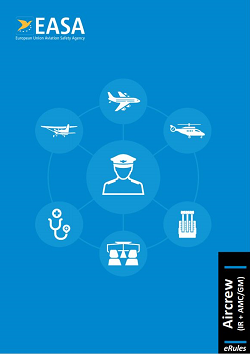ARA.MED.315 Review of examination reports
Regulation (EU) No 1178/2011
The licensing authority shall have a process in place to:
(a) review examination and assessment reports received from theAeMCs, AMEs and GMPs and inform them of any inconsistencies, mistakes or errors made in the assessment process; and
(b) assist AMEs andAeMCs on their request regarding their decision on aero-medical fitness in contentious cases.
AMC1 ARA.MED.315(a) Review of examination reports
ED Decision 2012/006/R
GENERAL
(a) The process to review examination and assessment reports received from AeMCs, AMEs and GMPs should aim to check all reports received.
(b) The licensing authority should take account of the proportion of inconsistencies or errors found in the assessment process and adapt the sample size accordingly and to review all reports if necessary.
ARA.MED.325 Secondary review procedure
Regulation (EU) No 1178/2011
The competent authority shall establish a procedure for the review of borderline and contentious cases with independent medical advisors, experienced in the practice of aviation medicine, to consider and advise on an applicant’s fitness for medical certification.
ARA.MED.330 Special medical circumstances
Regulation (EU) 2015/445
(a) When new medical technology, medication or procedures are identified that may justify a fit assessment of applicants otherwise not in compliance with the requirements, research may be carried out to gather evidence on the safe exercise of the privileges of the licence.
(b) In order to undertake research, a competent authority, in cooperation with at least one other competent authority, may develop and evaluate a medical assessment protocol based on which these competent authorities may issue a defined number of pilot medical certificates with appropriate limitations.
(c) AeMCs and AMEs may only issue medical certificates on the basis of a research protocol if instructed to do so by the competent authority.
(d) The protocol shall be agreed between the competent authorities concerned and shall include as a minimum:
(1) a risk assessment;
(2) a literature review and evaluation to provide evidence that issuing a medical certificate based on the research protocol would not jeopardise the safe exercise of the privileges of the licence;
(3) detailed selection criteria for pilots to be admitted to the protocol;
(4) the limitations that will be endorsed on the medical certificate;
(5) the monitoring procedures to be implemented by the competent authorities concerned;
(6) the determination of end points for terminating the protocol.
(e) The protocol shall be compliant with relevant ethical principles.
(f) The exercise of licence privileges by licence holders with a medical certificate issued on the basis of the protocol shall be restricted to flights in aircraft registered in the Member States involved in the research protocol. This restriction shall be indicated on the medical certificate.
(g) The participating competent authorities shall:
(1) provide the Agency with:
(i) the research protocol before implementation;
(ii) the details and qualifications of the nominated focal point of each participating competent authority;
(iii) documented reports of regular evaluations of its effectiveness;
(2) provide the AeMCs and AMEs within their jurisdiction with details of the protocol before implementation for their information.
AMC1 ARA.MED.330 Special medical circumstances
ED Decision 2016/008/R
GENERAL
The protocol should:
(a) assess the incapacitation risk;
(b) assess the risk of subtle impairment of performance;
(c) undertake a risk-benefit analysis;
(d) include a review of the regulations in use in other major aviation States and ICAO;
(e) determine which class of medical certificate is included in the scope;
(f) estimate the number of pilots likely to be included;
(g) list all anticipated risks to the protocol and provide a risk management strategy including appropriate limitations for every anticipated risk; where the risk of subtle impairment of performance is identified, the protocol should include requirements for minimum simulator testing or minimum line-flying under supervision or both;
(h) nominate medical research experts, if necessary, to provide advice on research methods.
AMC1 ARA.MED.330(b)(c) Special medical circumstances
ED Decision 2016/008/R
GENERAL
Initial medical certificates issued on the basis of a protocol should only be issued by the competent authority. Thereafter, the competent authority should decide whether the AeMC or AME may issue the medical certificate.
GM1 ARA.MED.330 Special medical circumstances
ED Decision 2016/008/R
GENERAL
(a) When the terms ‘medical assessment protocol’, ‘research protocol’ and ‘protocol’ (as mentioned in ARA.MED.330 and its associated AMC) are used, they all refer to a ‘medical assessment protocol’.
(b) The protocol is to enable experience to be gained in special medical circumstances in a controlled manner. This is to facilitate a better understanding of the treatment or condition, so that an evidence-based decision concerning its implementation may be considered.
(c) The protocol and its implementation should comply with the principles described in the following publication of the World Medical Association (WMA): “WMA Declaration of Helsinki - Ethical Principles for Medical Research Involving Human Subjects”, as last amended.
